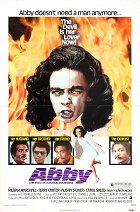Director:
William GirdlerCámara:
William L. AsmanMúsica:
Robert O. RaglandReparto:
William Marshall, Terry Carter, Austin Stoker, Juanita Moore, Carol Speed, Don Henderson, Nancy Lea Owen, Nathan CookReseñas (1)
Though the film became known primarily as a blaxploitation knock-off of the legendary The Exorcist, it should not be underestimated as unimaginative plagiarism. On the contrary, a viewing reveals not only clever work with the source of inspiration, but also a number of positive aspects in purely genre terms. Abby was made at a time when blaxploitation, as a parallel genre of African-American pop culture, was at its peak, but at the same time was beginning to run out of steam. The main reason for viewers’ abandonment of blaxploitation was the broadly appealing high-concept films and blockbusters of the new Hollywood, such as Friedkin’s The Exorcist, together with the gradual shift of African-American motifs to television. In this respect, Abby is a crystal-clear demonstration of the basic principle of its category, which consists in the appropriation and rewriting of classic hits, genres, formulas and narrative templates of the dominant culture into a form that resonates with a minority audience. Therefore, in this version of the story of possession by an essential evil, Christianity and its mythology form only one of the main narrative lines. Characteristically set in a modern urban environment, the film combines the motifs of ancient African mysticism with an African-American form of Christianity. For all of that, Abby remains an unexpectedly functional and forceful horror movie, the main strength of which is the female lead, Carol Speed, whose expressive physical acting and ability to instantly alternate between a chaste woman and a truly terrifying monster with distinctive body language make Abby a chilling spectacle. Her spectral creations and makeup-enhanced face get deeply embedded in the viewer’s memory thanks to the effectively aggressive editing, so that one forgets the otherwise obvious shortcomings arising from the evidently miniscule budget and half-baked screenplay.
()
